Ethiopian New Year, also known as Enkutatash, is a time of joy, reflection, and connection. Celebrated on September 11th (or September 12th during a leap year), this day marks the end of the rainy season and the start of a new year in the Ethiopian calendar.
Rich in cultural significance, this holiday is filled with various activities that bring families and communities together.
What makes the Ethiopian New Year truly special are the unique customs and traditions that have been preserved and passed down for generations.
10) Listen to Tizita Music
Tizita music is a perfect way to celebrate the Ethiopian New Year. This genre is known for its nostalgic and emotional melodies. It often brings back memories of Ethiopia’s cultural history.
Many artists, like Ephrem Gebremeskel, have created beautiful Tizita songs. His music can be found on YouTube and other platforms. These songs can provide a calming and reflective atmosphere for your celebrations.
Tizita music is not just modern. There are collections of old classical and instrumental Tizita that you can explore. These can transport you to a different time while still celebrating the present.
You can find non-stop Tizita music playlists. Listening to these can keep the traditional vibes flowing throughout your New Year’s festivities.
Take some time to enjoy and appreciate the soothing, calming tunes of Tizita.
9) Take Part in Gena Celebration
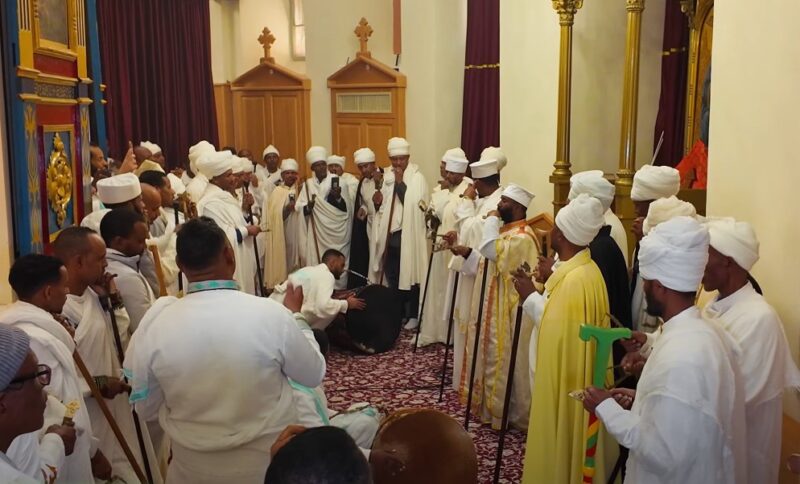
Gena, also known as Ethiopian Christmas, falls on January 7. It marks the birth of Jesus Christ and is one of the most important religious holidays in Ethiopia.
Attending a church service is a key part of the celebration. Many people go to church for a special service that starts late on Christmas Eve and goes until the early hours of Christmas morning. The service includes prayers, hymns, and sometimes a candlelight procession.
Fasting is another important tradition. For 43 days leading up to Gena, called the Advent fast, many Ethiopian Orthodox Christians abstain from meat and dairy products.
On the day of Gena, you can join in a communal feast. This feast typically includes dishes like injera (a type of flatbread), doro wat (spicy chicken stew), and other traditional foods. Sharing food with family and friends is central to the celebration.
Games are also played on Gena. A traditional game called ye-gena chewata, which is similar to hockey, is often played in rural areas. It’s a fun way to experience Ethiopian culture and connect with the community.
Participating in Gena offers a deep, rich cultural experience. You get to be part of a joyous and meaningful celebration that brings people together in faith and tradition.
8) Witness the Sheger Parade
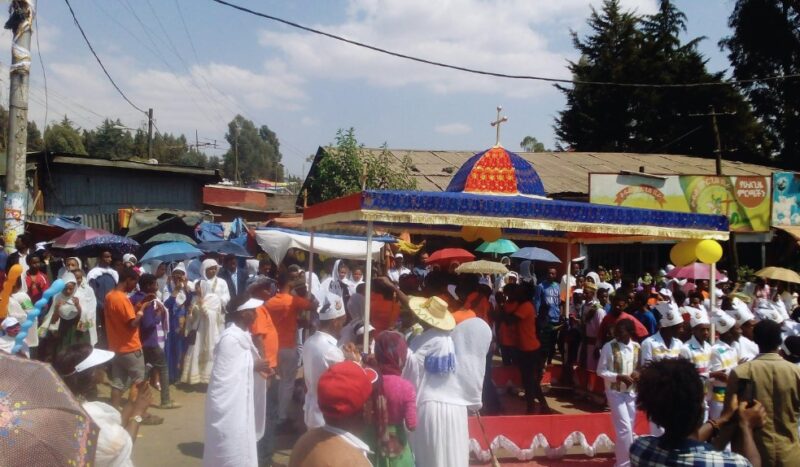
The Sheger Parade is a vibrant and colorful part of the Ethiopian New Year celebrations. It takes place in Addis Ababa, the capital city. You will see a lively display of culture and tradition.
The parade features traditional Ethiopian music and dance. Participants wear bright, traditional clothing. The energy is infectious, making it a memorable experience.
Floats decorated with flowers and flags add to the spectacle. You might even see people dressed as historical figures. The parade is a beautiful blend of old and new traditions.
Thousands of people gather to watch. If you want the best view, arrive early. The streets fill up quickly.
Vendors line the parade route. You can buy traditional Ethiopian foods and souvenirs. It’s a great way to enjoy local cuisine and take home a piece of the celebration.
Children especially love the parade. They often join in the dancing and singing. It’s a family-friendly event that everyone can enjoy.
To truly experience the Sheger Parade, immerse yourself in the crowd. Feel the rhythm, taste the food, and enjoy the joyful atmosphere. It’s a unique way to celebrate the Ethiopian New Year.
7) Burn Etan Sticks
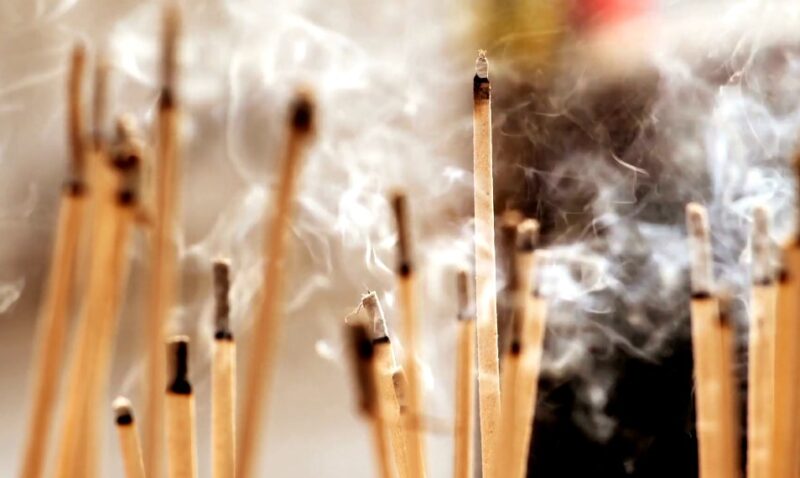
Burning Etan sticks is an important part of the Ethiopian New Year celebration. These sticks are made from resin collected from native trees.
You light the sticks, and they produce a pleasant, fragrant smoke. This smoke is often used to cleanse homes and create a welcoming atmosphere.
When you burn Etan sticks, it is a way to connect with the spiritual aspects of Enkutatash. The practice has been passed down through generations.
Make sure to carry out this tradition safely. Always burn the sticks in a well-ventilated area and keep them away from flammable materials.
Incorporating Etan sticks into your celebration adds a touch of authenticity and reverence to the New Year festivities.
6) Send a New Year Card
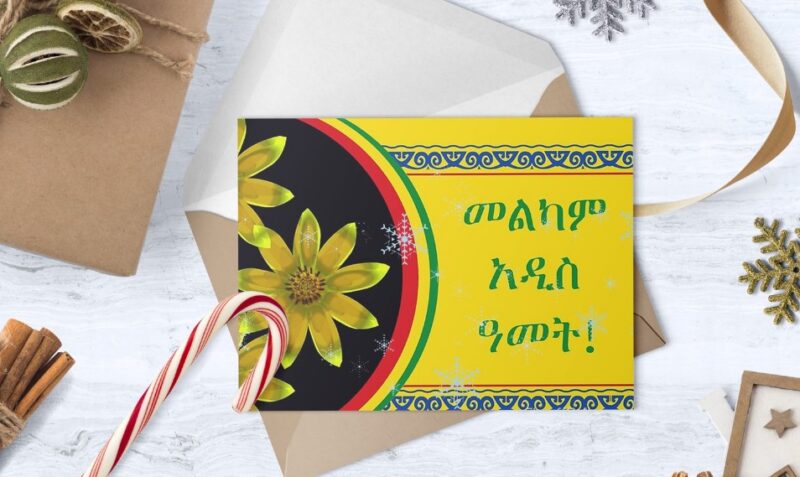
Sending a New Year card is a thoughtful way to celebrate the Ethiopian New Year, known as Enkutatash. It allows you to share good wishes and blessings with your loved ones.
You can choose from a variety of designs that reflect Ethiopian culture. Look for cards that feature traditional symbols, colors, and greetings unique to Enkutatash.
Creating personalized cards can make your gesture even more special. Add a heartfelt message, a memorable photo, or a unique design to make your card stand out. If you’re looking for an easy way to customize your card, you can create and print a greeting card for free, allowing you to design something unique without any cost.
If you prefer something more creative, consider handmade cards. Use materials like colorful paper, markers, and stickers to craft a unique design. Incorporate Ethiopian motifs and themes for an authentic touch.
For a digital option, e-cards can be a convenient choice. Many websites offer customizable templates where you can add your message and images. This is a quick way to reach family and friends who are far away.
Remember to send your cards a few days before the New Year on September 11. This ensures they arrive on time and bring joy to the recipients.
5) Enjoy Doro Wat
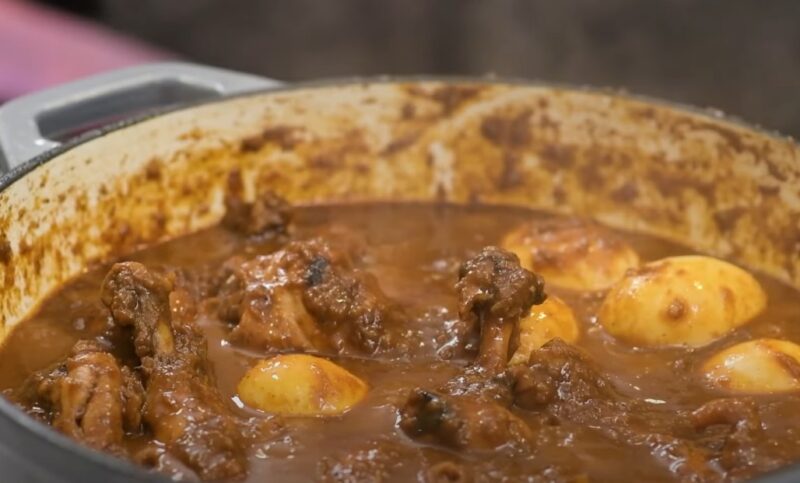
Doro Wat, a spicy chicken stew, is a must-have dish during Enkutatash. This flavorful meal is made with chicken, hard-boiled eggs, and a variety of spices. The spicy sauce is the heart of this dish, and it perfectly captures the warmth and energy of the Ethiopian New Year celebration.
To make Doro Wat, start by marinating chicken in lemon juice. Then, cook it in a sauce made from berbere spice mix, onions, garlic, and ginger. Add hard-boiled eggs towards the end of cooking.
Serving Doro Wat with injera, a sourdough flatbread, is traditional. Injera soaks up the spicy sauce, making every bite delicious. You can also add plain yogurt to balance the heat of the spices.
Doro Wat is more than just food; it’s part of the celebration. Families gather to prepare the stew, sharing stories and enjoying each other’s company. Eating together reinforces the sense of community that is central to Enkutatash.
Whether you are cooking Doro Wat at home or enjoying it at a local Ethiopian restaurant, this dish is sure to make your New Year celebration special.
4) Wear Traditional Habesha Clothes
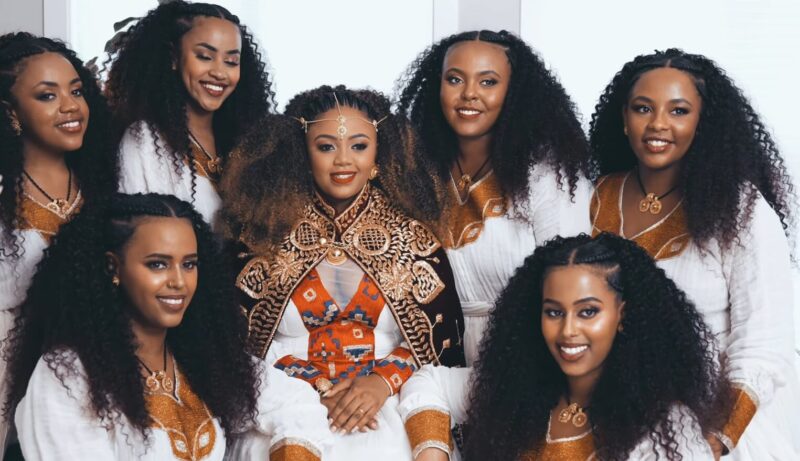
Wearing traditional Habesha clothes is a special way to celebrate the Ethiopian New Year. These garments include the Habesha Kemis for women and the Habesha Libs for men.
The Habesha Kemis is a long dress made from white cotton or chiffon. It often features intricate embroidery, especially around the neckline and sleeves.
Men typically wear the Habesha Libs, which includes a white shirt and pants. They might also add a traditional shawl called a Gabi for a complete look.
Adding modern touches to these traditional garments is becoming more common. Designers now use various fabrics, colors, and patterns to give the clothes a contemporary flair.
Wearing these traditional outfits allows you to connect with your cultural heritage. It also adds a sense of community and togetherness to the celebrations.
By wearing Habesha clothes, you show respect for Ethiopian traditions and add vibrancy to the New Year festivities.
3) Attend a Coffee Ceremony
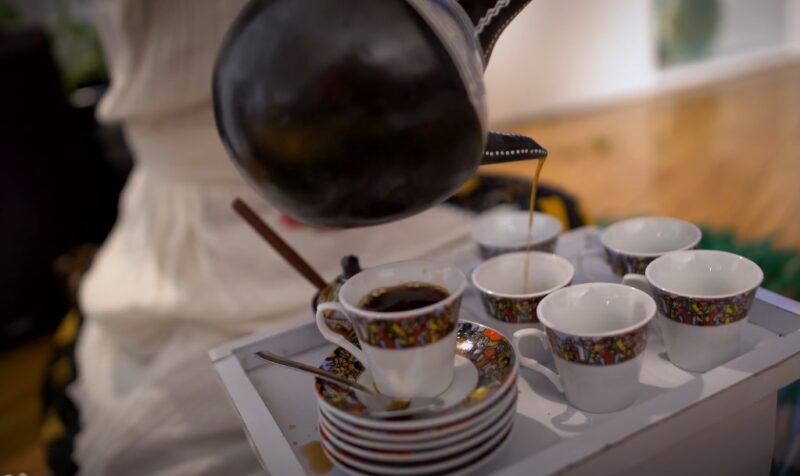
One memorable way to celebrate the Ethiopian New Year is by attending a traditional coffee ceremony.
The ceremony is a cherished cultural event that showcases Ethiopia’s rich coffee heritage.
The ceremony starts with the roasting of green coffee beans. The aroma fills the room, creating a warm and inviting atmosphere.
Next, the roasted beans are ground by hand. This process symbolizes the care and respect given to coffee in Ethiopian culture.
The ground coffee is then brewed in a special pot called a jebena. The coffee is poured into small cups from a height, allowing it to foam and cool slightly.
During the ceremony, family and friends gather to share the coffee. It is a time to enjoy each other’s company, discuss important matters, and connect on a deeper level.
2) Join the Timkat Procession
In Ethiopia, Timkat, or Epiphany, is celebrated on January 19th (or 20th in leap years). It commemorates the baptism of Jesus Christ in the Jordan River.
The Timkat procession is a special event you won’t want to miss. It begins early in the morning with priests and followers marching through the streets. They carry replicas of the Ark of the Covenant, known as tabots.
The procession is accompanied by singing, chanting, and the beating of drums. The crowd wears traditional white garments, creating a sea of white that moves together in unity.
The procession ends at a body of water, such as a river or a pool, where a priest blesses the water. Many people then immerse themselves in the blessed water, reenacting the baptism of Jesus.
Participating in the Timkat procession is a way to experience Ethiopian culture and spirituality firsthand. It’s an event filled with faith, tradition, and community. Whether you’re a local or a visitor, the vibrant celebration is sure to leave a lasting impression.
1) Visit Meskel Square
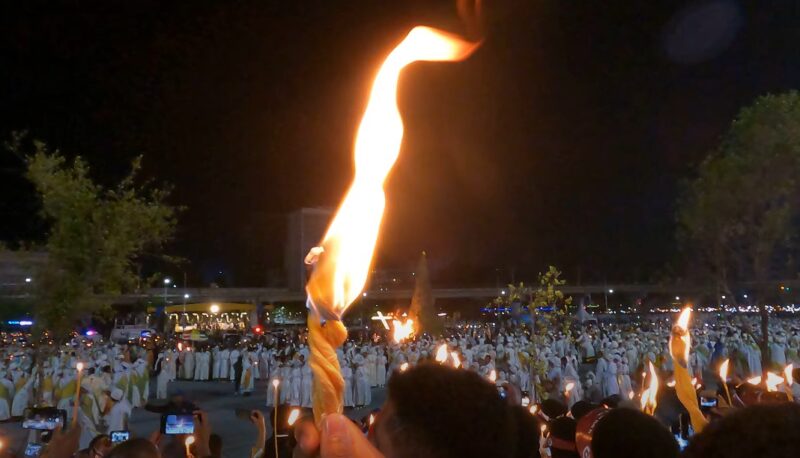
Meskel Square in Addis Ababa is a hub of activity during the Ethiopian New Year. Originally built in the 1960s to host an important religious celebration, it has since become a significant cultural site.
When you visit Meskel Square, you’ll find locals gathered to celebrate with various activities. Games of pool are common, and there’s often music and dancing.
The square’s name, Meskel, means “cross” in Amharic, highlighting its religious significance. The annual Meskel celebration involves lighting a large bonfire, which symbolizes the finding of the True Cross by Queen Helena.
Being there allows you to take part in this traditional event and feel the unity and joy among the people. The atmosphere is festive, and you’ll get to experience genuine Ethiopian culture.
Don’t miss the chance to visit Meskel Square if you are in Addis Ababa for the Ethiopian New Year. The square provides a perfect backdrop for photos, making your visit unforgettable.
Join the community in celebrating, and enjoy the vibrant activities that make this place special during the New Year.
The Bottom Line
Celebrating Ethiopian New Year, or Enkutatash, offers a rich tapestry of experiences and traditions.
Engaging in these customs brings you closer to Ethiopian culture.
Exploring these 10 unique ways to celebrate can not only broaden your horizons but also provide a deeper appreciation for the traditions and festivities of Enkutatash.
